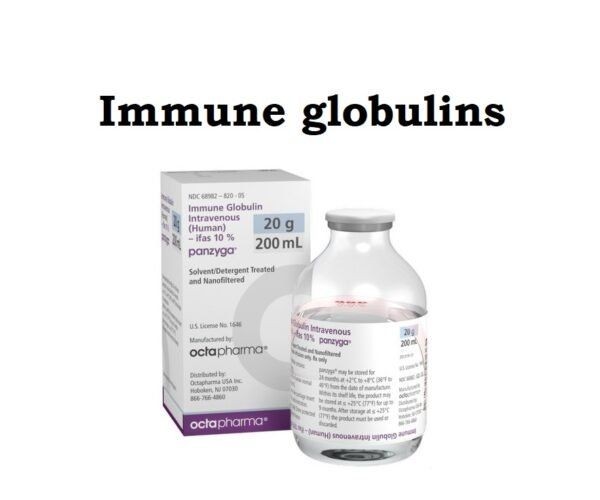
Contents
immune globulin IM (IGIM)
Immune globulin IM (IGIM) is a solution of antibodies administered intramuscularly (IM) to prevent viral, bacterial, and parasitic diseases in persons exposed or at risk for exposure to these microorganisms.
Immune globulin is prepared from pooled donor plasma, the liquid component of blood, and is used to strengthen immunity in people with immunodeficiencies.
Immune globulin IM solution contains primarily immunoglobulin G (IgG) antibodies, which provide passive immunization by increasing circulating antibodies. These antibodies recognize antigens unique to specific pathogens, neutralizing them or marking them for destruction by the immune system.
Immune globulin IM is used in the prevention of infection in the following diseases:
- Hypogammaglobulinemia, a disorder with low serum antibody levels
- Agammaglobulinemia, an inherited condition with extremely low serum antibodies
Warnings
- Do not administer immune globulin IM to patients with:
- Severe systemic hypersensitivity or anaphylactic reactions to human immune globulin.
- Immunoglobulin A (IgA) deficient people with antibodies against IgA and a history of hypersensitivity.
Side Effects of immune globulin IM
Common side effects include:
- Hypersensitivity reactions such as rash, hives, swelling, flushing, shortness of breath, and severe allergic reactions.
- Pain and tenderness, inflammation.
Call your doctor immediately if you experience any of the following symptoms or serious side effects while using this drug:
- Serious heart symptoms including fast or pounding heartbeats, fluttering in your chest, shortness of breath, and sudden dizziness.
- Severe headache, confusion, slurred speech, severe weakness, vomiting, loss of coordination, feeling unsteady.
- Severe nervous system reaction with very stiff muscles, high fever, sweating, confusion, fast or uneven heartbeats, tremors, and feeling like you might pass out.
- Serious eye symptoms including blurred vision, tunnel vision, eye pain or swelling, or seeing halos around lights.
This is not an exhaustive list of side effects or adverse reactions. Contact your doctor or report side effects to the FDA at 1-800-FDA-1088.
Dosages of immune globulin IM
Injectable solution
- GamaSTAN
- 16.5% protein/mL (2-mL, 5-mL single-dose vials)
- 15-18% (150-180 mg/mL), (2-mL, 5-mL, 10-mL single-dose vials)
Adult and Pediatric:
Preexposure prophylaxis upon travel into endemic areas
Limitations of use
- Not standardized with respect to antibody titers against hepatitis B surface antigen (HBsAg) and must not be used for prophylaxis of viral hepatitis type B; prophylactic treatment to prevent hepatitis B can best be accomplished with the use of hepatitis B immune globulin (Human), often in combination with Hepatitis B Vaccine
- Not indicated for routine prophylaxis or treatment of rubella, poliomyelitis, mumps, or varicella
Drug Interactions
Talk to your doctor about potential drug interactions before starting or changing any medications.
- No severe interactions have been reported with immune globulin IM.
- Some serious interactions include:
- axicabtagene ciloleucel
- brexucabtagene autoleucel
- ciltacabtagene autoleucel
- idecabtagene vicleucel
- lisocabtagene maraleucel
- tisagenlecleucel
- BCG vaccine live
- efgartigimod alfa
- measles (rubeola) vaccine
- measles mumps and rubella vaccine, live
- measles, mumps, rubella and varicella vaccine, live
- rubella vaccine
- smallpox (vaccinia) vaccine, live
- varicella virus vaccine live
- ethotoin
- fosphenytoin
- phenytoin
- protein a column
These are not all the possible interactions or adverse effects. Check with your doctor or pharmacist for more information.
Always inform your doctor or healthcare provider about all prescription and over-the-counter medications you use, as well as the dosage for each, and keep a list of this information.
By clicking Submit, I agree to the MedicineNet’s Terms & Conditions & Privacy Policy and understand that I may opt out of MedicineNet’s subscriptions at any time.
Pregnancy and breastfeeding
- No available data exist on the safety of immune globulin IM administration in pregnant women or its effects on reproductive capacity or fetal development. Use during pregnancy should only occur when clearly needed.
- No data exist on the presence of immune globulin IM in breastmilk or its effects on production or the breastfed infant. The decision to breastfeed during treatment should consider the maternal clinical need for therapy, developmental and health benefits, and potential risks to the infant from drug exposure or the mother’s underlying condition.
Other information about immune globulin IM
- Avoid live attenuated vaccines such as mumps, rubella, and varicella for 6 months and measles (rubeola) vaccine for at least a year after receiving immune globulin IM.
- Inform your healthcare provider immediately if you experience hypersensitivity or severe allergic reactions after receiving IGIM, or symptoms of thrombosis such as pain and/or swelling of an arm or leg, warmth over the affected area, shortness of breath, chest pain, rapid pulse, numbness or weakness on one side of the body, or vision changes.
Summary
Immune globulin IM (IGIM) is a solution of antibodies administered intramuscularly (IM) to prevent viral, bacterial, and parasitic diseases in persons exposed or at risk for exposure to these microorganisms. It is used in replacement therapy for people with immunodeficiencies. Common side effects include hypersensitivity reactions, injection site reactions, nausea, headache, fever, and fatigue.


